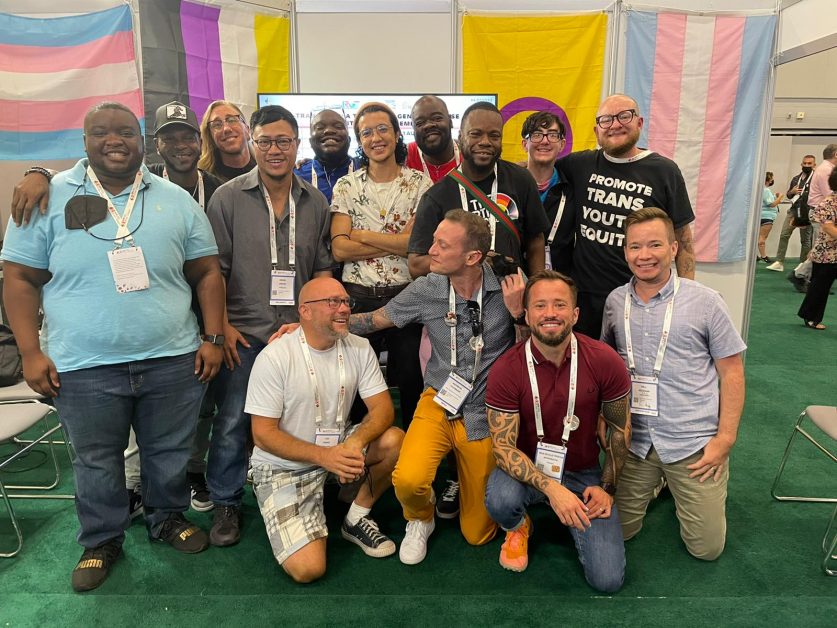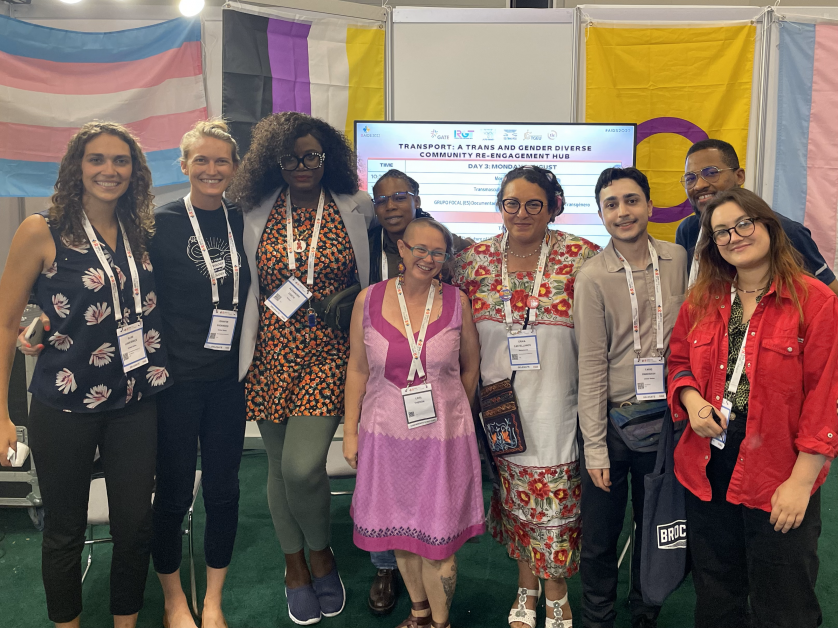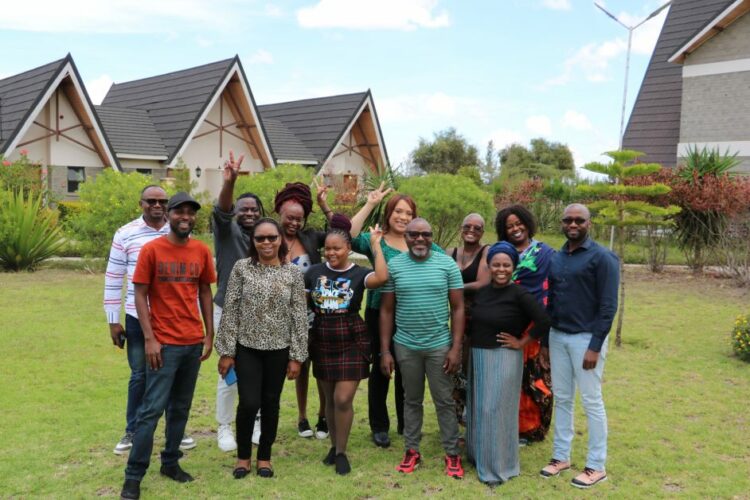GATE Executive Director, Erika Castellanos, has been appointed as a member of the newly formed Global Council on Inequality, AIDS, and Pandemics.
The lessons of HIV and COVID-19 make it clear that epidemics and inequalities are essentially interlinked. Socio-economic marginalization creates increased vulnerability to illness, while lack of access to health rights makes it more difficult for those at greatest risk to access treatment and prevention services, fuelling a cycle that prolongs and exacerbates epidemics and pandemics.
It is no coincidence that the trans and gender diverse community are at significantly higher risk of HIV and have experienced a similarly disproportionate impact during the COVID-19 pandemic. Around the world, trans and gender diverse community members face discrimination, marginalization, violence, and inequality in almost every sphere of life. Trans and gender diverse children experience high levels of bullying in school, as well as social isolation and exclusion from sporting and cultural activities. They are, therefore, at high risk of dropping out of education. They are also at risk of violence, abuse, and rejection from their families, and many trans and gender diverse children and youth are cut off from educational opportunities because their families do not support them. Many trans and gender diverse children and youth are abandoned by their families and become homeless, putting them at further risk of violence and abuse. These adverse childhood experiences create a greater risk of mental and physical ill health, while disruptions to education make it more difficult to access employment opportunities, resulting in socio-economic disadvantage.
Perhaps the biggest challenge facing trans and gender diverse community members is the lack of legal gender recognition in most countries. Legal recognition of personhood is a fundamental right that supports access to other basic rights. Without a legal framework that allows trans and gender diverse persons to be recognized for who they are, many people struggle to access employment and social services. When people cannot access identity documents that reflect their gender identity, they face stigma, discrimination, and exclusion when applying for jobs, attempting to open bank accounts, and trying to access social security and other State services. As a result, many trans and gender diverse community members work in the survivalist and informal sectors of the economy, which are the sectors most vulnerable to economic shocks caused by pandemics and natural disasters. Trans and gender diverse persons are also more likely to be unemployed, and financially dependent on intimate partners, which increases vulnerability to HIV.
Trans and gender diverse persons are more likely than the general population to be homeless. This is due to many factors, including high levels of poverty and unemployment, being thrown out of family homes, a lack of shelters willing to accommodate trans and gender diverse persons, and discriminatory laws. For example, the anti-LGBT legislation recently passed in Uganda criminalizes the renting of accommodation to LGBT persons and has resulted in increasing homelessness among trans persons, who are the most visible members of the LGBT community. Homelessness and housing insecurity further contribute to the risk of health issues and violence, making it more difficult to access health services and adhere to medical treatment. Homeless transgender women are at particular risk of violence and harassment by law enforcement officials.

The trans and gender diverse community is not homogenous, and community members who are impacted by multiple, intersecting forms of discrimination and marginalization (such as racism, xenophobia, discrimination based on disability, and gender-based violence) are at higher risk of underlying health conditions, including HIV, TB, cancer, and diabetes, which in turn create greater vulnerability to serious illness during pandemics. Existing discrimination and violence may also be heightened during crisis situations, such as pandemics, with marginalized groups becoming the targets of public anger, creating a negative feedback loop of increasing marginalization and vulnerability to disease.
Obtaining access to health care is also a major challenge for trans and gender diverse persons. Stigma and discrimination in the health system remain one of the greatest barriers to accessing healthcare services, particularly in countries with hostile legal environments. The World Health Organization’s World Health Statistics Report 2023 notes,
Certain subpopulations are at a higher risk of HIV infections. Progress is slower in regions where most new infections occur in key populations that are subject to criminalization, violence, and social exclusion.
WHO World Health Statistics Report 2023
For many trans and gender diverse persons, access to gender-affirming health care is a cornerstone of mental and physical wellness. Still, access to gender-affirming care is limited in many countries. It is often not covered by national health services or medical aid schemes, meaning that it is either inaccessible to community members or must be paid for out of pocket, resulting in an additional financial burden. Recently, there have been steps to introduce anti-human rights laws that criminalize the provision of gender-affirming care in some countries. For example, some states in the USA have passed laws or introduced bills that create legal penalties for doctors who provide medically necessary gender-affirming care to trans and gender diverse youth.

In this bleak context, the trans and gender diverse community is creating its own hope, through increasingly organized community-led responses, to both health challenges and the underlying structural inequalities. From the early days of the HIV epidemic, people living with HIV and communities at risk have mobilized to advocate for access to health rights. The trans and gender diverse human rights movement is relatively young but growing, with networks of community-led organizations operating at international, regional, and national levels. These organizations are frequently underfunded but have been highly effective in advocating for greater access to social, economic, and political rights for the trans and gender diverse community in many countries. With sufficient support and funding, trans and gender diverse-led organizations can participate in national HIV responses and provide crucial input on the most relevant and necessary interventions for their constituencies. The 2021 – 2026 Global AIDS Strategy recognizes the central role of communities impacted by HIV in effective HIV responses and recommends the increased involvement of community-led organizations in initiatives to combat stigma and discrimination, provide peer support programs, increase community prevention and treatment literacy to allow community members to participate in the own health care meaningfully, and support differentiated service delivery to marginalized groups. Research shows that community-led HIV responses are highly effective in improving knowledge and health literacy, ensuring better adherence and viral load suppression, improving access to services and retention in care, and addressing structural barriers, such as discrimination within the health care system.
Investing in the health care system and in community-led responses also has beneficial effects beyond addressing specific health challenges. A recent study has demonstrated that fully funded national HIV responses can save millions of lives and create significant positive changes in the healthcare system and the broader economy.
GATE’s Erika Castellanos emphasizes that international platforms, such as the Global Council on Inequality, AIDS, and Pandemics, have an important role to play in mobilizing support for community-led organizations as integral components of health responses.
We are at a pivotal point. We know what is effective in combating epidemics: investment in public health systems and in community-led health and human rights responses. We can use these effective strategies to reach our targets for controlling HIV, TB, COVID-19, Hepatitis, and Mpox and preparing for future pandemics. We also know that criminalization and discrimination add fuel to epidemics and pandemics. We urgently need an international commitment to supporting the community-led organizations worldwide who are on the frontline in the struggle for a healthier and more just world, which will benefit us all.
Erika Castellanos, GATE






